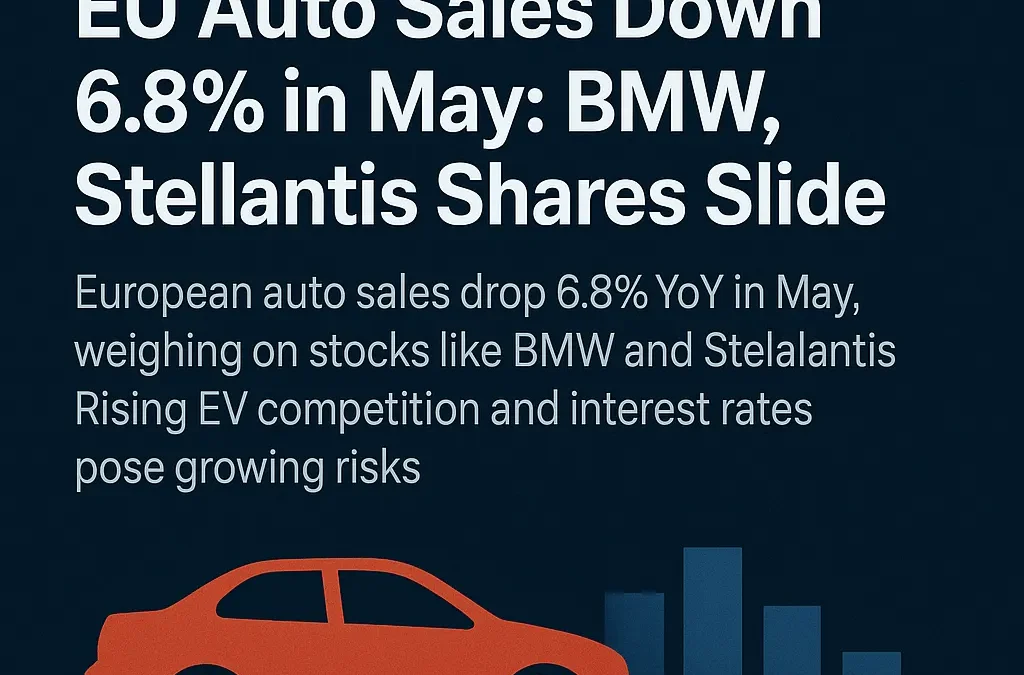EU Auto Sales Down 6.8% in May: BMW, Stellantis Shares Slide as EV Competition Heats Up
Europe’s Auto Sector Slams the Brakes
European automakers are facing fresh turbulence as passenger car sales across the EU fell by 6.8% year-over-year in May 2025, according to the European Automobile Manufacturers’ Association (ACEA). This decline, driven by slowing consumer demand, high interest rates, and fierce competition from Chinese electric vehicle (EV) brands, has rattled investors.
Auto industry stocks across Germany, France, and Italy responded negatively, with BMW, Stellantis, and Volkswagen all posting losses on the day of the announcement
📉 Market Reaction: Stocks Shift Into Reverse
The European stock markets opened lower after the auto sales data was released:
- BMW (Germany): ▼ 2.5%
- Stellantis (Italy/France): ▼ 1.9%
- Volkswagen (Germany): ▼ 2.8%
The EURO STOXX Auto & Parts Index dropped by 2.2%, reflecting sector-wide pessimism.
Meanwhile, some EV stocks in Asia and the U.S. rose, including BYD (+3.4%) and Tesla (+1.6%), as investors shift focus to new market leaders in EV production.
What are the reason’s Behind the Decline?
1. Rising Interest Rates
Higher borrowing costs continue to affect consumer financing for new vehicles. In many EU countries, auto loan interest rates are above 6%, making car purchases less attractive.
2. EV Transition Costs
Traditional automakers are still catching up with the EV transition. The upfront R&D and production investments are cutting into profit margins, even as EV adoption grows.
3. Import Pressure from China
China’s aggressive EV push into Europe — led by BYD, NIO, and XPeng — is disrupting local automakers. Cheaper EV models and government subsidies make Chinese cars more appealing in price-sensitive segments.
Industry Trends: EV Leaders vs Legacy Struggles
Europe’s auto sector is at a crossroads. Legacy manufacturers like Renault, Peugeot, and Mercedes-Benz are speeding up their EV investments, but they are still behind Chinese and American counterparts in price, range, and software integration.
Some notable developments:
- Tesla’s Berlin Gigafactory ramped up production, putting pressure on VW and BMW in their home market.
- BYD plans to open a manufacturing plant in Hungary, signaling long-term commitment to the EU market.
- Stellantis recently paused one of its internal combustion engine (ICE) car lines in Italy to shift resources toward EVs.
Key Data from ACEA
- Total EU car registrations in May: 960,120 units
- May 2024 comparison: 1,030,450 units
- Decline: –6.8% YoY
- Biggest market drops: Germany (–8.2%), France (–7.1%), Spain (–5.6%)
- EV sales share: 24.3% (up from 18.5% YoY)
While EV sales continue to rise, they haven’t fully offset declines in ICE vehicle demand.
What This Means for Investors
Investors are becoming more cautious on European auto stocks due to:
- Profit margin pressure
- Higher input costs (battery materials, labor)
- Rising warranty claims for early EV models
- Global trade uncertainties
However, long-term investors may look for value buys in beaten-down stocks like Renault or Stellantis, especially if they show improved EV profitability by Q3 2025.
Strategic Moves to Watch
- Volkswagen’s EV software upgrade rollout in Q3
- BMW’s next-gen battery platform launch
- Stellantis’ shift to Chinese battery suppliers
- Possible EU tariffs on Chinese EV imports (under review)

